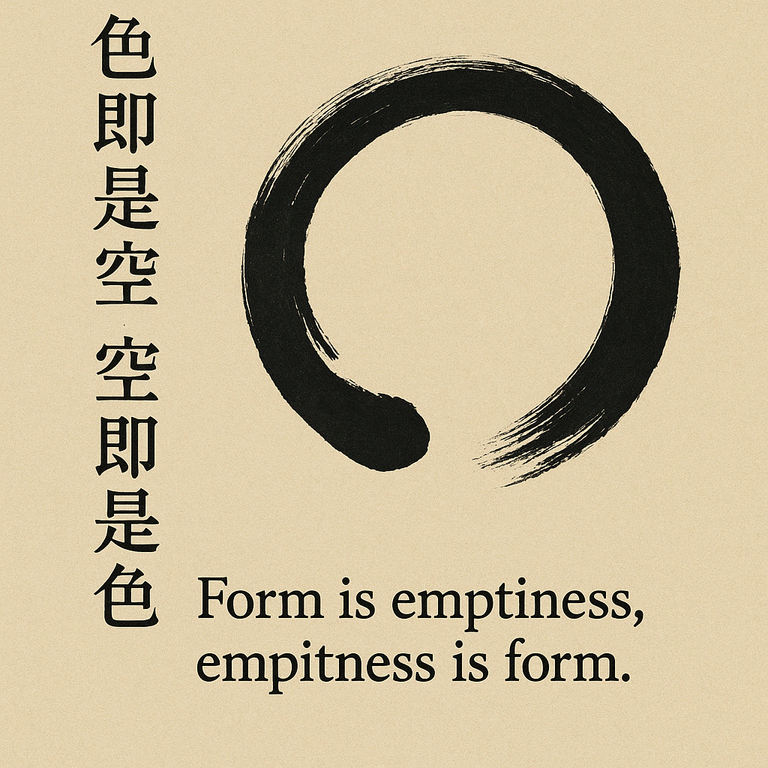Form Is Emptiness, Emptiness Is Form; or, The is No God and He is Always With You
In Sanshōdōeishū 6, Zen master and Sōtō founder Dōgen Zenji wrote:
春は花 夏ほととぎす 秋は月 冬雪さえて すずしかりけり
haru wa hana natsu hototogisu aki wa tsuki
fuyu yuki saete suzushikarikeri
in spring, the flowers;
in summer, the cuckoo’s song;
in autumn, the moon;
and in winter, the snow—clear and cold.
how serene it is.
or even more simply:
spring—blossoms
summer—cuckoo song
autumn—the moon
winter—clear, white snow
such calm, such clarity.
This tanka expresses profound peace in the transient beauty of each season. Each thing is just what it is. There’s no clinging, no abstraction—just direct experience, moment after moment. And yet the very simplicity reveals deep emptiness: all things arise and pass, conditioned and impermanent.
There is a saying in Zen Buddhism. It goes:
色即是空、空即是色
Form is emptiness, emptiness is form.

This seeming paradox is from the Heart Sutra—one of the most well-known texts in Mahayana Buddhism and the only sutra Zen Buddhism really has much use for. On the surface, it may sound like a riddle, a spiritual tongue-twister, perhaps something mysterious—profound in that characteristically cryptic Zen way. But if we sit with it a while, we may find that it’s not just religious poetry—it’s a key to making sense of our everyday experience.
What does it mean?
“Form” (色, shiki) refers to the material world, the things we see, touch, and interact with—our bodies, our homes, our possessions, the dinner we ate last night. “Emptiness” (空, kū) refers to the absence of an independent, permanent, unchanging self in anything. All things arise dependent on other things: causes, conditions, perceptions. Nothing exists in isolation, nothing stays fixed.
So to say “form is emptiness” is to remind ourselves that all the concrete things in our lives are not as solid or lasting as they seem. They are made of parts, subject to change, and ultimately out of our control. But then—immediately—we’re told “emptiness is form.” This isn’t nihilism. Emptiness doesn’t mean nothing exists. It means that even though everything is empty of permanence or self, it still appears, still functions, still matters.
There is no God and He is always with you.
How does this apply to daily life?
This teaching doesn’t just belong on a temple wall. It has real implications for how we live.
- Stress at work? The form of the situation feels heavy, immovable. But it’s empty—ever-shifting, shaped by causes you may not see. Tension can dissolve. Roles change. Even your reaction can shift with awareness.
- Arguments with loved ones? A harsh word feels solid, final. But it’s empty—just sound, just emotion, just history. Understanding this helps us respond instead of react.
- Material cravings? The new phone, the house, the perfect body… They’re all form. And they’re all empty. That doesn’t mean they’re meaningless—it just means they won’t satisfy the deeper hunger. Shogyō mujō (諸行無常)—All things are impermanent.
- Moments of beauty? A sunset, a song, your child’s laughter. These are fleeting, yes—but their impermanence is what makes them precious. Because they’re empty, they’re also alive, vivid, present. Emptiness is form. Ichigo ichie (一期一会)—One time, one meeting, or in other words "This moment will never come again.”
Letting Go and Showing Up
This paradox reminds us that we don’t need to cling to anything, nor do we need to run away. The trick is to see clearly, without grasping or resisting.
When we recognize the emptiness in form, we loosen our grip on things we thought were fixed—our identities, our stories, our fears. When we see that emptiness manifests as form, we also commit more deeply to the here-and-now, knowing that each moment is unique and irretrievable.
This isn’t an escape from life. It’s a deeper way of being in it.
And if all that seems too confusing, just refer back to Dogan's poem above and go look at the spring blossoms—but also don't cling and watch them fall with the same joy.
❦
 |
David is an American teacher and translator lost in Japan, trying to capture the beauty of this country one photo at a time and searching for the perfect haiku. He blogs here and at laspina.org. Write him on Mastodon. |
It's a paradoxical dichotomy! 😃
Always!
https://www.reddit.com/r/DebateReligion/comments/1k2rjdj/form_is_emptiness_emptiness_is_form_or_the_is_no/
The rewards earned on this comment will go directly to the people( @flummi97 ) sharing the post on Reddit as long as they are registered with @poshtoken. Sign up at https://hiveposh.com. Otherwise, rewards go to the author of the blog post.
Wow I love this! Such simple words hold so much power and meaning 🫡
We appreciate you taking the time, to either use #ThoughtfulDailyPost, or otherwise help this Community grow. So...
Thank you!!